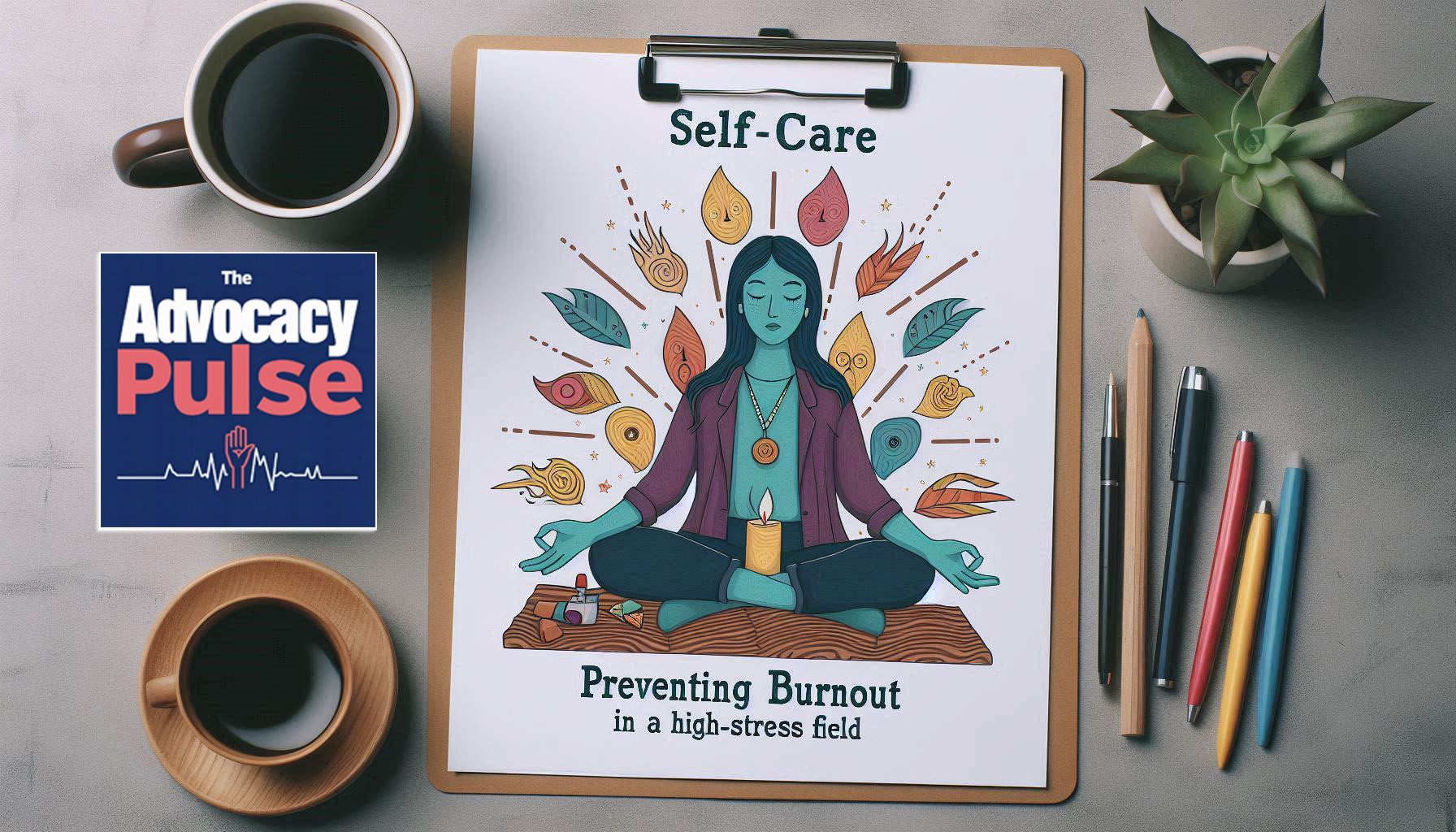

A BlogCast for Victim Advocates
Self-Care Strategies for Victim Advocates: Preventing Burnout in a High-Stress Field

Episode/Blog Transcript
Self-Care Strategies for Victim Advocates: Preventing Burnout in a High-Stress Field
Note: We recognize the depth of your experience, but even the most seasoned professionals occasionally need a reminder or a quick refresher.
You are on the front lines of providing support, empathy, and resources to individuals who have experienced trauma. Whether working with survivors of domestic violence, sexual assault, or other crimes, you play a pivotal role in helping people rebuild their lives. However, the emotional demands of this work can be overwhelming, leaving many advocates vulnerable to burnout, compassion fatigue, and emotional exhaustion.
In a field where the stakes are high, it’s essential that you take proactive steps to care for yourself. Self-care isn't just a luxury—it's a necessity. By implementing effective self-care strategies, you can maintain your own mental and emotional well-being, continue to provide exceptional support to clients, and avoid burnout.
Understanding Burnout and Compassion Fatigue
Before we dive into self-care strategies, it’s important to understand the risks that you face in this line of work. Burnout and compassion fatigue are common challenges for individuals in helping professions.
- Burnout typically refers to a state of emotional, physical, and mental exhaustion caused by prolonged stress. It often manifests as feelings of detachment, cynicism, and a reduced sense of accomplishment.
- Compassion Fatigue is the emotional strain of dealing with the trauma and suffering of others. You may feel overwhelmed by the weight of your clients' pain and struggle to maintain empathy and emotional resilience.
Both of these conditions can impair your ability to perform your duties effectively and can lead to long-term health issues. That’s why self-care is not only important for personal well-being, but it’s also critical for professional success and sustaining a career in victim advocacy.
Self-Care Strategies for Victim Advocates
1. Establish Healthy Boundaries
Victim advocates often form deep emotional connections with the survivors they serve, and while empathy is essential in this work, it’s equally important to maintain healthy boundaries. Without boundaries, it can be easy to become overwhelmed by your clients' emotions, carrying their pain with you long after the workday ends.
Tip: Set clear limits on your availability and emotional energy. Define what constitutes work time and personal time, and try not to let one bleed into the other. Practicing self-awareness and checking in with your emotional state throughout the day can help you maintain those boundaries.
2. Supervision and Peer Support
Having regular supervision and access to peer support can make a world of difference. Victim advocates need a safe space to process difficult emotions, share experiences, and receive guidance. Supervision isn't just for new advocates—it’s a valuable resource for seasoned professionals too.
Tip: Seek out regular debriefing sessions with your supervisor or a mentor. In addition, connect with peers who understand the challenges of victim advocacy and can offer support and validation. Sometimes, just knowing you’re not alone can be a powerful antidote to stress.
3. Engage in Mindfulness and Stress-Relief Practices
Mindfulness, meditation, and other stress-relief practices can help victim advocates manage the day-to-day emotional toll of the job. These techniques promote relaxation, mental clarity, and emotional regulation—essential skills for anyone working in a high-stress environment.
Tip: Incorporate simple mindfulness exercises into your daily routine, such as deep breathing, body scans, or guided meditation. Even five minutes a day can help reset your mind and improve your emotional resilience. Apps like Headspace or Calm offer accessible guided sessions for beginners.
4. Practice Emotional Processing and Reflection
Victim advocates are often exposed to traumatic stories and distressing situations. It’s important to have a system in place to process and reflect on these experiences so they don’t accumulate and create long-term emotional strain.
Tip: Make time for regular journaling or reflective writing. Writing down your thoughts and feelings allows you to process your emotions, identify triggers, and develop coping strategies. If you’re not a fan of journaling, try talking with a trusted friend or therapist about your experiences to release any pent-up emotions.
5. Prioritize Physical Health
The mind and body are deeply connected, and neglecting physical health can exacerbate stress, anxiety, and burnout. Ensuring you get adequate rest, exercise, and nutrition can make a significant difference in how well you manage stress and maintain your energy levels.
Tip: Aim for regular physical activity, whether it’s going for a walk, practicing yoga, or hitting the gym. Don’t underestimate the power of sleep—make sure you're getting enough rest to recharge your body and mind. Eating nourishing, balanced meals also helps keep energy levels steady throughout the day.
6. Engage in Regular Time Off
Taking regular breaks, both short and long, is essential in preventing burnout. Victim advocacy work can be emotionally taxing, and stepping away from the demands of the job is necessary to maintain your well-being.
Tip: Schedule regular “mental health days” or vacation time to fully disconnect from work. Use this time for relaxation, hobbies, travel, or spending time with loved ones. When you do take time off, truly unplug—don’t check emails or answer work-related calls.
7. Engage in Meaningful Activities Outside of Work
It’s important to cultivate hobbies and interests that are completely separate from your work as a victim advocate. Having passions and activities outside of your professional role can provide a sense of fulfillment and joy that is not tied to your work-related stress.
Tip: Whether it's painting, playing an instrument, gardening, volunteering, or participating in a fitness class, make time for activities that recharge you and bring you joy. These moments of personal fulfillment can help you feel balanced and less defined by the emotional demands of your job.
8. Seek Professional Support When Needed
Sometimes, the emotional weight of victim advocacy work can feel too much to bear, and that’s okay. If you're feeling overwhelmed or emotionally drained, seeking professional support from a therapist or counselor is a vital step in maintaining your mental health.
Tip: Consider seeing a therapist who specializes in trauma or working with professionals in high-stress fields. Therapy can provide valuable tools for managing stress, emotional regulation, and trauma exposure.
The Bottom Line: Self-Care is Essential for Longevity
The work of a victim advocate is both demanding and rewarding. It requires deep empathy, strong problem-solving skills, and the ability to navigate complex emotional situations. However, without proper self-care, the emotional toll of the job can lead to burnout and compassion fatigue, reducing your ability to support survivors and diminishing your own well-being.
By implementing these self-care strategies, victim advocates can protect themselves from burnout, improve their emotional resilience, and continue to serve their clients with compassion and dedication. Remember, taking care of yourself is not only beneficial for your own health, but it also enables you to provide the best possible support for those who need it most.
The journey of advocacy is challenging, but with the right tools for self-care, it is also sustainable, fulfilling, and impactful.
On behalf of the team at Visible Digital Solutions, thank you for your service!
_____________________
Learn how our eVAC program can assist you with your victims of crime. Click here for more information.
RECENT POSTS
Tap the three lines to see Post list.
Copyright - Visible Digital Solutions LLC | Privacy Policy